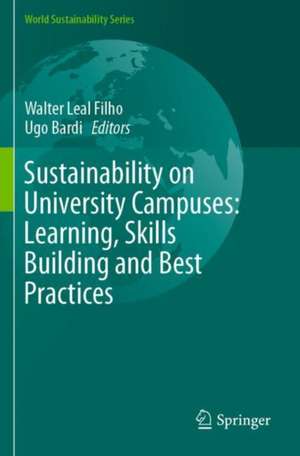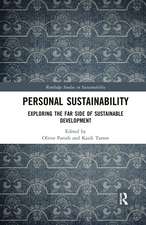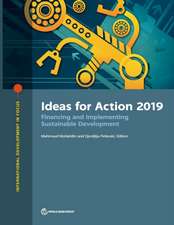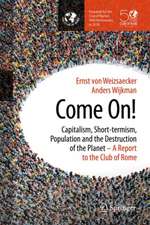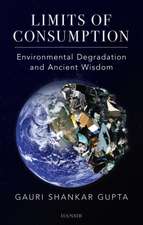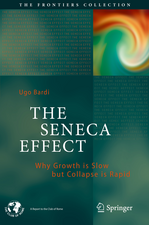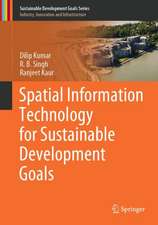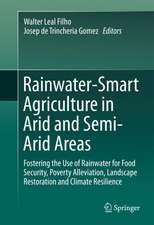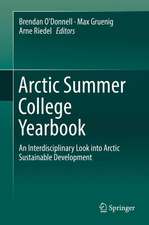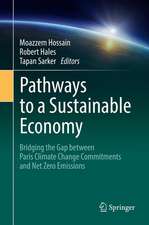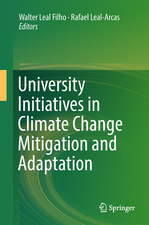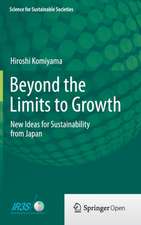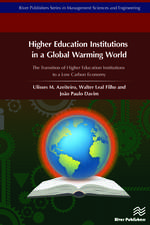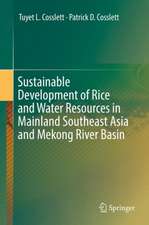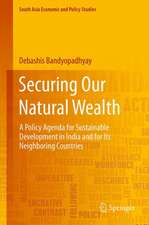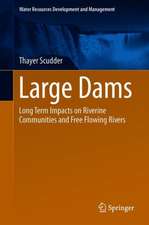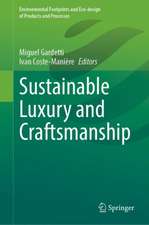Sustainability on University Campuses: Learning, Skills Building and Best Practices: World Sustainability Series
Editat de Walter Leal Filho, Ugo Bardien Limba Engleză Paperback – 14 aug 2020
The implementation of sustainability initiatives on campuses is an essential component of promoting sustainability in the higher education context. In addition to reflecting an awareness of environmental issues, campus programmes demonstrate how seriously universities take sustainability at the institutional level.
There is a lack of truly interdisciplinary publications that comprehensively address the issue of campus greening, and there is an even greater need for publications that do so at a truly international level. This book meets these needs. It is one of the outcomes of the “Second Symposium on Sustainability in University Campuses” (SSUC-2018), which was jointly organised by the University of Florence (Italy), Manchester Metropolitan University (UK), the Research and Transfer Centre “Sustainable Development and Climate Change Management” and the “European School of Sustainability Science and Research” at the Hamburg University of Applied Sciences (Germany), in cooperation with the Inter-University Sustainable Development Research Programme (IUSDRP).
The book showcases examples of campus-based research and teaching projects, regenerative campus design, low-carbon and zero-carbon buildings, waste prevention, and resilient transport, among others. Ultimately, it demonstrates the role of campuses as platforms for transformative social learning and research, and explores the means by which university campuses can be made more sustainable.
The aims of this publication are as follows:
• to provide universities with essential information on campus greening and sustainable campus development initiatives from around the world;
• to share ideas and lessons learned in the course of research, teaching and projects on campus greening and design, especially successful initiatives and good practice; and
• to introduce methodological approaches and projects intended to integrate the topic of sustainable development in campus design and operations.
This book gathers contributions from researchers and practitioners in the field of campus greening and sustainable development in the widest sense, from business and economics, to the arts, administration and the environment, and hailing from Europe, Latin America, North America and Asia.
| Toate formatele și edițiile | Preț | Express |
|---|---|---|
| Paperback (1) | 654.77 lei 6-8 săpt. | |
| Springer International Publishing – 14 aug 2020 | 654.77 lei 6-8 săpt. | |
| Hardback (1) | 910.26 lei 6-8 săpt. | |
| Springer International Publishing – 21 iun 2019 | 910.26 lei 6-8 săpt. |
Din seria World Sustainability Series
- 18%
 Preț: 1241.73 lei
Preț: 1241.73 lei - 20%
 Preț: 882.17 lei
Preț: 882.17 lei - 18%
 Preț: 898.26 lei
Preț: 898.26 lei - 18%
 Preț: 1563.56 lei
Preț: 1563.56 lei - 18%
 Preț: 1015.38 lei
Preț: 1015.38 lei - 18%
 Preț: 1668.06 lei
Preț: 1668.06 lei - 24%
 Preț: 747.95 lei
Preț: 747.95 lei - 18%
 Preț: 1116.09 lei
Preț: 1116.09 lei - 18%
 Preț: 1416.29 lei
Preț: 1416.29 lei - 18%
 Preț: 1561.82 lei
Preț: 1561.82 lei - 15%
 Preț: 648.05 lei
Preț: 648.05 lei - 18%
 Preț: 735.21 lei
Preț: 735.21 lei - 18%
 Preț: 2509.51 lei
Preț: 2509.51 lei - 15%
 Preț: 723.98 lei
Preț: 723.98 lei - 15%
 Preț: 650.19 lei
Preț: 650.19 lei - 18%
 Preț: 1244.89 lei
Preț: 1244.89 lei - 15%
 Preț: 649.87 lei
Preț: 649.87 lei - 18%
 Preț: 787.15 lei
Preț: 787.15 lei - 18%
 Preț: 1395.94 lei
Preț: 1395.94 lei - 15%
 Preț: 649.54 lei
Preț: 649.54 lei - 15%
 Preț: 652.17 lei
Preț: 652.17 lei - 18%
 Preț: 1555.51 lei
Preț: 1555.51 lei - 18%
 Preț: 1141.83 lei
Preț: 1141.83 lei - 18%
 Preț: 953.35 lei
Preț: 953.35 lei - 18%
 Preț: 1390.59 lei
Preț: 1390.59 lei - 15%
 Preț: 650.55 lei
Preț: 650.55 lei - 18%
 Preț: 915.48 lei
Preț: 915.48 lei - 18%
 Preț: 1240.16 lei
Preț: 1240.16 lei - 18%
 Preț: 909.33 lei
Preț: 909.33 lei - 15%
 Preț: 648.42 lei
Preț: 648.42 lei - 18%
 Preț: 905.85 lei
Preț: 905.85 lei - 18%
 Preț: 962.98 lei
Preț: 962.98 lei - 18%
 Preț: 1018.06 lei
Preț: 1018.06 lei - 18%
 Preț: 967.22 lei
Preț: 967.22 lei - 18%
 Preț: 1403.22 lei
Preț: 1403.22 lei - 18%
 Preț: 1017.92 lei
Preț: 1017.92 lei - 18%
 Preț: 965.97 lei
Preț: 965.97 lei - 18%
 Preț: 972.00 lei
Preț: 972.00 lei - 18%
 Preț: 1230.84 lei
Preț: 1230.84 lei
Preț: 654.77 lei
Preț vechi: 770.31 lei
-15% Nou
Puncte Express: 982
Preț estimativ în valută:
125.29€ • 131.16$ • 103.67£
125.29€ • 131.16$ • 103.67£
Carte tipărită la comandă
Livrare economică 05-19 aprilie
Preluare comenzi: 021 569.72.76
Specificații
ISBN-13: 9783030158668
ISBN-10: 3030158667
Pagini: 580
Ilustrații: X, 580 p. 105 illus., 93 illus. in color.
Dimensiuni: 155 x 235 mm
Greutate: 0.82 kg
Ediția:1st ed. 2019
Editura: Springer International Publishing
Colecția Springer
Seria World Sustainability Series
Locul publicării:Cham, Switzerland
ISBN-10: 3030158667
Pagini: 580
Ilustrații: X, 580 p. 105 illus., 93 illus. in color.
Dimensiuni: 155 x 235 mm
Greutate: 0.82 kg
Ediția:1st ed. 2019
Editura: Springer International Publishing
Colecția Springer
Seria World Sustainability Series
Locul publicării:Cham, Switzerland
Cuprins
Preface.- Part 1. Institutional Practices and Frameworks.- Chapter 1. Engaging Students and Campus Community in Sustainability Activities in a Major Canadian University.- Chapter 2. A Review of an Integrated Information System and Sustainability Implementation Framework in Higher Education.- Chapter 3. How the structures of a Green Campus promotes the development of sustainability competences. The experience of the University of Bologna.- Chapter 4. Generating a New Idea of Public Mission for Universities. A Sustainable Communication Paradigm for Community Building.- Chapter 5. Involving students in implementing a campus culture of sustainability, etc.
Textul de pe ultima copertă
The implementation of sustainability initiatives on campuses is an essential component of promoting sustainability in the higher education context. In addition to reflecting an awareness of environmental issues, campus programmes demonstrate how seriously universities take sustainability at the institutional level.
There is a lack of truly interdisciplinary publications that comprehensively address the issue of campus greening, and there is an even greater need for publications that do so at a truly international level. This book meets these needs. It is one of the outcomes of the “Second Symposium on Sustainability in University Campuses” (SSUC-2018), which was jointly organised by the University of Florence (Italy), Manchester Metropolitan University (UK), the Research and Transfer Centre “Sustainable Development and Climate Change Management” and the “European School of Sustainability Science and Research” at the Hamburg University of Applied Sciences (Germany), in cooperation with the Inter-University Sustainable Development Research Programme (IUSDRP).
The book showcases examples of campus-based research and teaching projects, regenerative campus design, low-carbon and zero-carbon buildings, waste prevention, and resilient transport, among others. Ultimately, it demonstrates the role of campuses as platforms for transformative social learning and research, and explores the means by which university campuses can be made more sustainable.
The aims of this publication are as follows:
• to provide universities with essential information on campus greening and sustainable campus development initiatives from around the world;
• to share ideas and lessons learned in the course of research, teaching and projects on campus greening and design, especially successful initiatives and good practice; and
• to introduce methodological approachesand projects intended to integrate the topic of sustainable development in campus design and operations.
This book gathers contributions from researchers and practitioners in the field of campus greening and sustainable development in the widest sense, from business and economics, to the arts, administration and the environment, and hailing from Europe, Latin America, North America and Asia.
Caracteristici
Highly interdisciplinary, covering the social sciences, economics, business, education and the environmental sciences Comprehensively describes campus greening initiatives Provides universities with a sound basis for promoting sustainability efforts on campus
